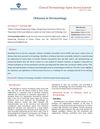 5 citations,
October 2013 in “Veterinary Clinics of North America: Equine Practice”
5 citations,
October 2013 in “Veterinary Clinics of North America: Equine Practice” Some horses lose hair without inflammation or itching due to various conditions, and while mainly a cosmetic issue, diagnosis requires examination and biopsies, and breeding is not advised if it's hereditary.
 3 citations,
January 2010 in “Elsevier eBooks”
3 citations,
January 2010 in “Elsevier eBooks” The document describes various skin conditions, their features, and treatments but lacks detailed study size information.
[object Object]  165 citations,
January 2014 in “Dermatology Research and Practice”
165 citations,
January 2014 in “Dermatology Research and Practice” Zinc is effective for treating various skin conditions, including warts and acne.
 1 citations,
October 2013 in “Actas Dermo-Sifiliográficas”
1 citations,
October 2013 in “Actas Dermo-Sifiliográficas” Customized medications made through compounding can be beneficial for various skin conditions but require careful regulation and collaboration between doctors and pharmacists.
 1 citations,
June 2015 in “Australasian Journal of Dermatology”
1 citations,
June 2015 in “Australasian Journal of Dermatology” A patient with Cronkhite-Canada syndrome improved with nutritional support and steroids, but early diagnosis is key due to high mortality.
139 citations,
October 2005 in “Journal of Investigative Dermatology” The nail matrix has a reduced immune response, protecting it from autoimmunity.
 33 citations,
October 2017 in “Drug Safety”
33 citations,
October 2017 in “Drug Safety” SJS/TEN survivors often have severe, overlooked long-term physical problems that are not properly treated after leaving the hospital.
 21 citations,
June 2011 in “Journal of child neurology”
21 citations,
June 2011 in “Journal of child neurology” Valproic acid and carbamazepine do not change biotin or biotinidase levels but may lower zinc levels, still within normal range.
 12 citations,
June 2023 in “Journal of trace elements in medicine and biology”
12 citations,
June 2023 in “Journal of trace elements in medicine and biology” Eating too much selenium can cause bad breath, hair loss, and nail changes, with harmful effects starting at low daily doses.
[object Object]  6 citations,
May 2022 in “Frontiers in Microbiology”
6 citations,
May 2022 in “Frontiers in Microbiology” Marine microbes could be used in cosmetics for sun protection, skin care, and possibly preventing hair loss.
 January 2018 in “Clinical dermatology open access journal”
January 2018 in “Clinical dermatology open access journal” Chitosan is useful in skin treatments because it helps with wound healing and cell growth.
January 2024 in “Cosmetics” Menopause worsens skin, hair, and nails, affecting self-esteem and quality of life.
24 citations,
January 2018 in “Development” Frizzled 3 and Frizzled 6 together control the orientation of mouse hair follicles.
 18 citations,
January 2004 in “Dermatologic Clinics”
18 citations,
January 2004 in “Dermatologic Clinics” Skin problems in older people can indicate hormonal diseases, nutritional deficiencies, or conditions like diabetes, menopause, and HIV.
 8 citations,
April 2022 in “The journal of investigative dermatology/Journal of investigative dermatology”
8 citations,
April 2022 in “The journal of investigative dermatology/Journal of investigative dermatology” Certain genetic changes in the LSS gene cause a rare skin and hair condition.
 3 citations,
November 2021 in “Applied Microscopy”
3 citations,
November 2021 in “Applied Microscopy” Hair microscopy is a simple and cost-effective method to help diagnose systemic diseases in children.
 January 2025 in “Scientific Reports”
January 2025 in “Scientific Reports” Hair analysis can show changes in vitamin D levels over time.
34 citations,
July 2020 in “American journal of human genetics” Changes in the SREBF1 gene cause a rare genetic skin and hair disorder.
 13 citations,
August 2020 in “Mayo Clinic proceedings”
13 citations,
August 2020 in “Mayo Clinic proceedings” Women with lichen planopilaris often have thyroid disease, depression, anxiety, and may respond to treatment with slowed disease progression.
 4 citations,
June 2013 in “The Journal of Rheumatology”
4 citations,
June 2013 in “The Journal of Rheumatology” The document concludes that various findings in rheumatology offer insights into disease severity, treatment responses, and potential risks in medication, with some limitations due to unspecified participant numbers.
2 citations,
December 2021 in “Pharmaceutics” Finasteride-loaded proniosomes effectively promote hair growth in mice.
 June 2024 in “Stem cell research & therapy”
June 2024 in “Stem cell research & therapy” Regenerative medicine shows promise for treating skin disorders like hair loss and vitiligo.
 August 2023 in “Journal of The American Academy of Dermatology”
August 2023 in “Journal of The American Academy of Dermatology” New treatments for hair loss include low-dose pills, updated drugs, supplements, light therapy, plasma injections, and advanced hair transplant techniques.
 December 2017 in “Springer eBooks”
December 2017 in “Springer eBooks” Transplant patients often get skin problems, with treatments varying by condition.
 January 2025 in “Frontiers in Pediatrics”
January 2025 in “Frontiers in Pediatrics” Baricitinib significantly improved hair regrowth and skin condition in a 14-year-old with alopecia areata and atopic dermatitis.
 1 citations,
August 2024 in “Polymers”
1 citations,
August 2024 in “Polymers” The P25H5-O microneedles effectively deliver substances through hair follicles and are safe for skin cells.
 30 citations,
November 2012 in “Anais Brasileiros De Dermatologia”
30 citations,
November 2012 in “Anais Brasileiros De Dermatologia” Diagnosing diffuse alopecia, a hair loss condition, can be challenging and may require a scalp biopsy or tracking the disease's progression when symptoms and skin tests aren't enough.
 April 2020 in “Journal of evolution of medical and dental sciences”
April 2020 in “Journal of evolution of medical and dental sciences” A one-year-old child with a genetic condition had symptoms improved by treating zinc deficiency.
 2 citations,
December 2018 in “Journal of cosmetic dermatology”
2 citations,
December 2018 in “Journal of cosmetic dermatology” Higher CRBP1 levels are linked to more severe alopecia areata.
 1 citations,
June 2021 in “International Journal of Dermatology”
1 citations,
June 2021 in “International Journal of Dermatology” People with alopecia areata had lower vitamin D levels, but these levels didn't relate to many aspects of the condition.
























